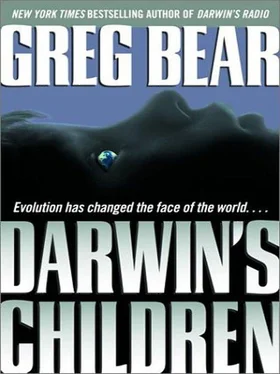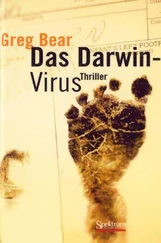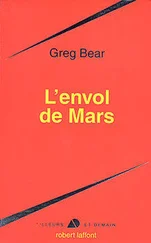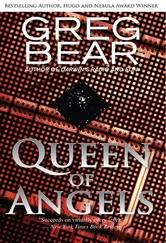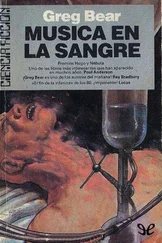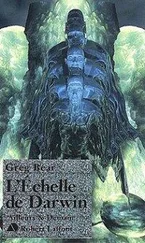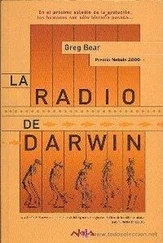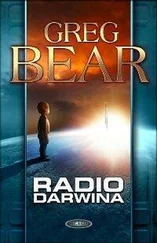“Pray they don’t have to do anything,” Kaye whispered grimly to Mitch.
“Shush,” Mitch warned. “They’re doctors.”
“From Russia , Mitch,” Kaye responded. “How long since they’ve done anything but set a broken leg or dress a wound?”
As Mitch caught a catnap, in the twelfth hour of Stella’s long delivery—that had not changed much, difficult births for babies with large heads—Kaye stood outside the infirmary and breathed the cold early morning air and watched the snow.
While Kaye taught in the village school, Mitch had helped the Shevites restore a small lumber mill and clear the debris from the old concrete foundations and start putting up new houses for the families.
It was not yet clear what shape those families would take; probably not just father, mother, and children, and on this score the Sakartvelos were as clueless as Kaye and Mitch. There had never been so many Shevites together before; though some said there were larger communities in the East and the South, perhaps in New Jersey or Georgia or Mississippi, lying low.
The young Shevites were designing the homes. They felt uncomfortable when deprived of company for more than a few hours. Large windows Kaye could certainly understand, after so many years in cramped dorms and even cells. But there was no double pane glass available, not yet, and winters in Oldstock could be cold. While the foundations provided some constraint on their imaginations, some of the drawings were looking very odd indeed: bathrooms and toilet facilities without walls—“Why privacy? We know what’s happening”—and narrow “scent shafts” connecting adjacent homes. The whole idea of privacy seemed up for grabs.
Kaye’s best moments were spent with Stella and Mitch and Stella’s deme. Most of the students in Kaye’s class were part of Stella’s deme. Her curiosity and relative ease with these intruder humans, her parents, seemed to blend over into those closest to her, and that extended family had adopted Kaye and Mitch.
The Sakartvelos, on the other hand, treated Kaye and Mitch civilly enough, but seldom socialized. They seemed a little standoffish even with the others in their community, perhaps because of early trauma and years of living alone, growing middle-aged with little company.
The concept and practice of demes was still growing, but the demes formed thus far made up the most stable of all the social structures and experiments going on in Oldstock, and the oldest. Stella’s deme consisted of seven permanent partners—three males and four females—and twelve exchange members.
Deme partners usually did not mate, though they could fall in love—Stella was very definite about that, but not very clear what it entailed. Romantic love was running wild in Oldstock, complete with exchanges of dried fruit, perfumes when available, carved wooden statues, but such infatuations seldom had anything to do with sex.
Sex, it seemed, was too important to be left to the whims of romance. Love, yes, but not this boiling torrent of fickle affection.
In late summer, the paths and woods had sometimes smelled like an explosion in a cocoa factory, mixed with shocking and eye-stinging hints of musk and civet. Couples, all combinations—and sometimes triples—could be seen wrapped in congeries of self-involved, fondling splendor, intertwined, giggling, fever-scenting, persuading—everything but having sex.
At first, Kaye and Mitch had speculated that some of the couples and triples were too young, but soon the sixteen-year-olds were proving them wrong, mating outside the romance, and almost always across demes.
Those who were still prepubescent could become juniors in romantic groups, but such relationships were less demonstrative, more reserved and instructional. Love, and new varieties of passion, it seemed, would find many new uses in Shevite society, and the homes had to reflect these novelties.
Kaye’s thoughts darted back to the one thing she did not want to think about, not now. She lifted her eyes to the dark sky. She wanted to be around for her daughter, to be useful to Mitch and to Stella for many years. But the CDC had confirmed that there was indeed a post-SHEVA syndrome. Luella Hamilton had it; so did many others.
The tips of Kaye’s fingers and portions of her calves were growing numb as the months passed, her walk less quick, her strength and stamina waning.
She had told nobody at Oldstock, though Mitch knew. Kaye could seldom hide important things from Mitch. Except, of course, for what he did not want to hear.
The caller had touched her just a week ago. A short visit, pleasant but not conclusive; a social call. She had asked if she might be allowed to live to see her grandson born.
As before, no answers.
Inside the delivery room, Stella was surrounded by all the females in her deme. They alternately sang and read stories from old children’s books and put their heads together, rubbing their damp palms on hers to calm her and relieve her pain.
Stella leaned back at the last and her eyes seemed to slip up into her head. She gave a long, loud shriek, operatic in its intensity, and the room smelled like saltwater and violets. Everyone moaned together, no signal, just the way it was, would be, moaning in an over-under song of sympathy and greeting.
Stella gave a vigorous wriggle and then a shove, and her son came into the larger world. The moaning softened as the child was examined, and then changed to delighted coos and chuckles.
Yevgenia and Kaye cooperated in lifting the baby onto Stella’s stomach. Yevgenia smiled at Kaye. “Now you are truly grandmother,” she said.
The afterbirth came. Yuri moved them urgently to one side and caught it in a steel basin lined with a plastic bag. To Kaye’s surprise, Yuri insisted on cutting the cord, then wrapping and removing the placenta right away. He cleaned up all the blood with a sponge soaked in bleach, then brought basins of soapy water and insisted the helpers wash their hands.
He bathed Stella solicitously. “It might be dangerous, no touching,” Yuri insisted, and left the infirmary with the tissue.
Kaye was beyond analysis or caring. She huddled with her daughter and the females in the deme, and Mitch, and one young male, the stand-in for Will, looking confused and bewildered at this unexpected role.
The infant, wrinkled and small, squirmed slowly in Stella’s arms, seeking the breast, then looked up at them all, drawing back his eyelids until it seemed his face was all eyes, wide, mobile, focused. His cheeks flared golden and pink, melanophores shaping at first a series of flower-petal rawshocks. All those in the room, except for Kaye and Mitch, responded to the newborn with the same colors and patterns, flower petals and butterflies, sparks and flares, and the baby saw this and smelled their pleasure and delight. He smiled with saintly ease and reassurance as he took the nipple.
That smile took Kaye’s breath away. She squeezed Mitch’s hand. Ever the anthropologist, Mitch was watching the deme, the side mothers, all the Shevites in the room, with a quizzical expression.
“Do you have a name yet?” Kaye asked Stella.
Stella shook her head dreamily. “Give us time. Something nice.”
Moments later, suckling her son, Stella relaxed and slept. Her cheeks kept showing patterns. Even asleep, the new mother could sign her love.
The infant released his mother’s nipple and looked up at Mitch. “Sing,” he said.
The deme laughed, and the young man who was standing in for Will, in a burst of emotion, hugged them and shook Mitch’s hand. Kaye touched his shoulder and smiled up at him, and Mitch knelt beside the bed and sang the alphabet song, the same he had sung for Stella. “Ah, beh, say, duh, eh, fuh, guh, huh, kuh, ih, juh, em…”
Читать дальше
Конец ознакомительного отрывка
Купить книгу
